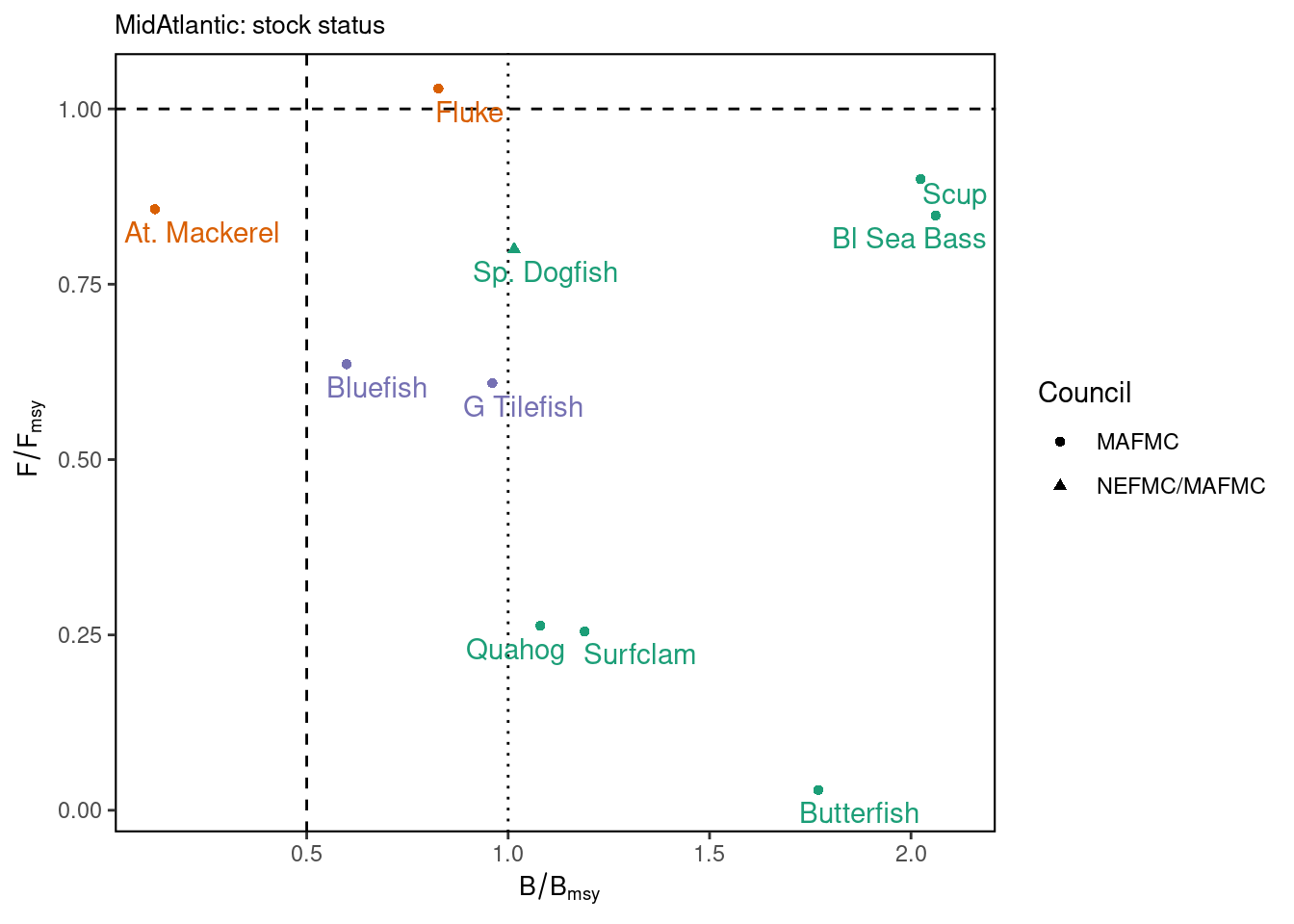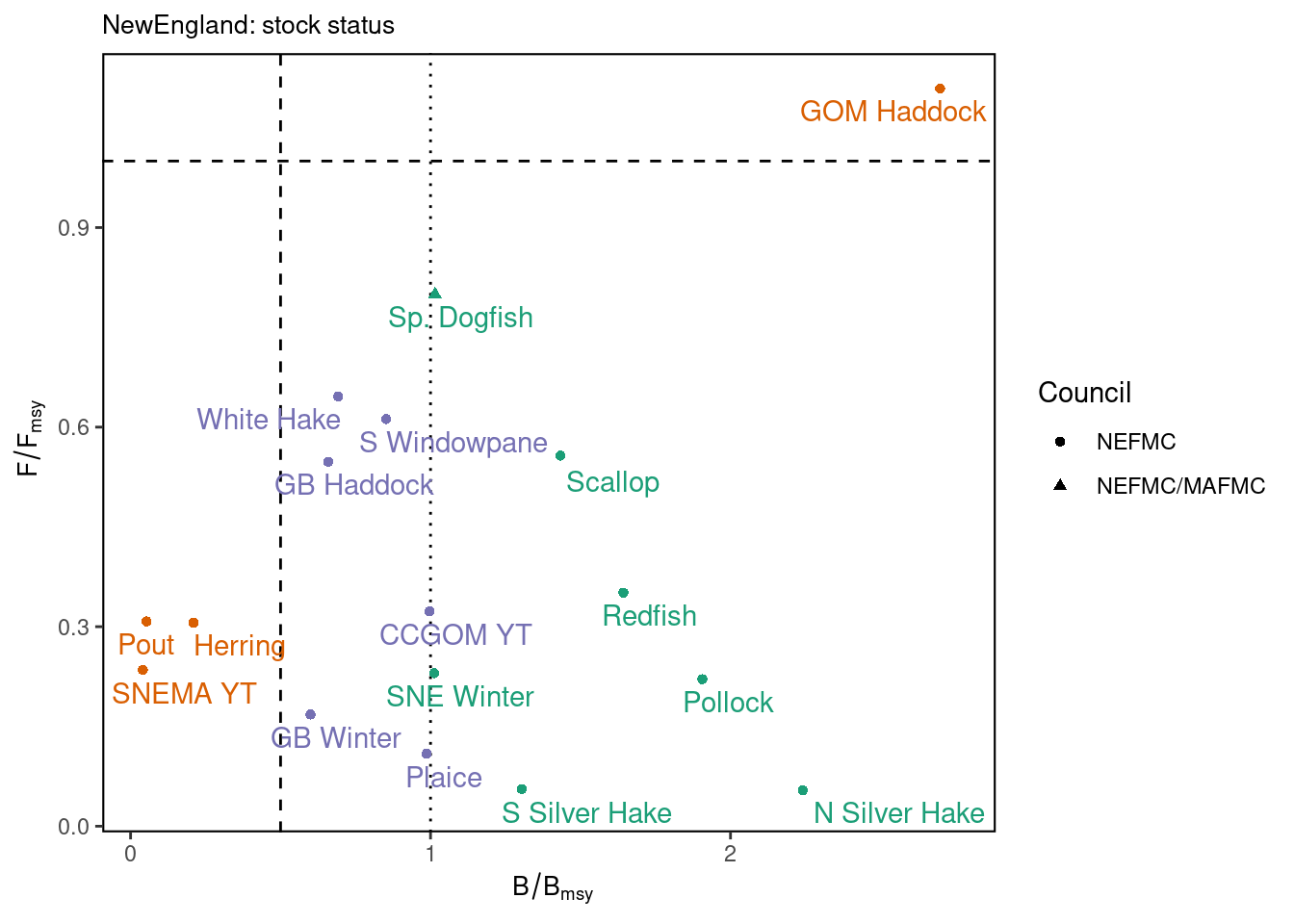72 Stock Status
Description: Summary of the most recent stock status results for each assessed species
Indicator family:
Contributor(s): Sarah Gaichas, Andy Beet, Jeff Vieser, Chris Legault
Affiliations: NEFSC
72.1 Introduction to Indicator
Stock assessments are conducted regularly for fisheries managed by the New England and Mid-Atlantic Fishery Management Councils to support decisions on catch limits and to determine whether conservation objectives for each stock are being met. Single species management objectives include 1. Maintaining biomass above minimum thresholds, and 2. Maintaining fishing mortality below overfishing limits.
This indicator summarizes the most recent stock status, defined as stock assessment estimated current biomass (B) relative to the biomass threshold (1/2 BMSY) and biomass target (BMSY), and current fishing mortality (F) relative to the fishing mortality limit (FMSY).
72.2 Key Results and Visualizations
Single species management objectives (1. maintaining biomass above minimum thresholds and 2. maintaining fishing mortality below overfishing limits) are being met for all but three MAFMC managed species, though the status of six stocks is unknown. Single species management objectives are not being met for some NEFMC managed species. Eight stocks are currently estimated to be below BMSY, while status relative to BMSY could not be assessed for 13 additional stocks.
72.2.1 MAB
#> $p
#>
#> $unknown
#> # A tibble: 5 × 3
#> Stock F.Fmsy B.Bmsy
#> <chr> <dbl> <dbl>
#> 1 Northern shortfin squid - Northwestern Atla… NA NA
#> 2 Blueline tilefish - Mid-Atlantic Coast NA NA
#> 3 Goosefish - Gulf of Maine / Northern George… NA NA
#> 4 Goosefish - Southern Georges Bank / Mid-Atl… NA NA
#> 5 Atlantic Chub Mackerel - Atlantic Coast NA NA72.2.2 NE
#> $p
#>
#> $unknown
#> # A tibble: 11 × 3
#> Stock F.Fmsy B.Bmsy
#> <chr> <dbl> <dbl>
#> 1 Atlantic salmon - Gulf of Maine NA NA
#> 2 Red deepsea crab - Northwestern Atlantic NA NA
#> 3 Atlantic cod - Gulf of Maine NA NA
#> 4 Atlantic halibut - Northwestern Atlantic C… NA NA
#> 5 Offshore hake - Northwestern Atlantic Coast NA NA
#> 6 Red hake - Gulf of Maine / Northern George… NA NA
#> 7 Red hake - Southern Georges Bank / Mid-Atl… NA NA
#> 8 Windowpane - Gulf of Maine / Georges Bank NA NA
#> 9 Witch flounder - Northwestern Atlantic Coa… NA NA
#> 10 Goosefish - Gulf of Maine / Northern Georg… NA NA
#> 11 Goosefish - Southern Georges Bank / Mid-At… NA NA72.3 Indicator statistics
Spatial scale: Stock-specific spatial scale, reported by Council
Temporal scale: Annual update for the aggregate; individual stock status 1-5 years depending on assessment cycle
Synthesis Theme:
72.4 Implications
Stock status affects catch limits established by the Council, which in turn may affect landings trends.
In the Mid Atlantic, stock status is unlikely to be contributing to landings trends. Status is above the minimum biomass threshold for all but one stock, and aggregate biomass trends appear stable, so the decline in MAB commercial seafood landings is most likely driven by market dynamics affecting the landings of surfclams and ocean quahogs, as landings have been below quotas for these species. The long term decline in total planktivore landings is largely driven by Atlantic menhaden fishery dynamics, including a consolidation of processors leading to reduced fishing capacity between the 1990s and mid-2000s.
In New England, stock status and associated management constraints are likely contributing to decreased landings. With the poor or unknown stock status of many managed species, the decline in commercial seafood landings in the Gulf of Maine most likely reflects lower catch quotas implemented to rebuild overfished stocks, as well as market dynamics.
72.5 Get the data
Point of contact: Sarah.Gaichas@noaa.gov
ecodata name: ecodata::stock_status
Variable definitions
Variables in ecodata::stock_status Stock: Name of stock
Last assessment: Most recent assessment year for stock status
Council: “MAFMC” (Mid Atlantic Fishery Management Council), “NEFMC” (New England Fishery Management Council), or “Both”
Code: Short stock name for plotting corresponding to Stock
Var: “F.Fmsy” (Current year fishing mortality F relative to FMSY) “B.Bmsy” (Current year biomass B relative to BMSY)
Value: Decimal value of Var Units: Unitless
Indicator Category:
72.7 Accessibility and Constraints
No response
tech-doc link https://noaa-edab.github.io/tech-doc/stock_status.html